a manifesto: the next era of third spaces as crucibles for meaning-making
meeting people where they are
As more people transition from survival to self-actualization and face crises of meaning, it becomes vital to create spaces that can meet them where they are. In adulthood, we often find ourselves in spaces defined by fixed identities and values, yet we yearn for spaces where we can experiment, wonder, and play with unbridled curiosity.
I believe that the next era of secular third spaces will fulfill the sense-making traditionally provided by religious congregations in society, without the prerequisite of supernatural or predefined canons of beliefs. To the creators of scenes, operators of spaces, and leaders of communities, I pose this question: What if pure communal meaning-making becomes the foundational ethos of our endeavors?
To grasp how third spaces can nourish meaning-making, we must understand meaning-making in American society today: less tethered to religious dogmas, yet ever yearning for spiritual sustenance.
Meaning-making is the art of construing, understanding, or making sense of life’s intricate patterns through lenses of novel or deep-rooted assumptions. As the developmental psychologist Robert Kegan wrote: “Human being is meaning making. For the human, what evolving amounts to is the evolving of systems of meaning; the business of organisms is to organize”.
Throughout history, religious institutions have served as portals for meaning-making, offering blueprints for one's values, rituals, and sense of belonging. However, for a growing segment of the population, the functions of religion has been unbundled and re-bundled into new skins: The “not religious” has soared from 5% to 30% since The Cold War, 1 in 3 Americans under 30 identify as a “none”, 50% of Americans are disconnected from a local congregation.
People may introspect through meditation apps, find moments of ecstatic connection at concerts, seek solace in nature to experience something greater, encounter the divine through relationship. We create quilts of values stitched together by resonant philosophers, spiritual guides, and luminous minds. Moreover, we collect fragments of different "religions" through ideological tribes, each resonating with the values of our current life stage.
Undoubtedly, the fundamental needs of introspection, ecstatic experiences, beauty, and the desire to merge with the cosmic symphony have echoed through the eons. Though religiosity may wane, the spiritual fire within remains undimmed. For some, spirituality finds its sanctuary within the halls of institutional religion. Yet for a multitude, it blossoms as a dynamic and personal voyage through the kaleidoscope of existence. We embark on this journey, traversing diverse landscapes of human experience, continually redefining what it means to live the "good life”. The spiritual path is a sacred pilgrimage of meaning-making, continuously unraveling.
This path we tread is fraught with paradoxes, luring us into the honeyed traps of self-delusion, beckoning us toward uncharted territories, and often leaving us with a lingering sense of isolation. Nevertheless, we embrace this sacred quest, for we long to express our spirituality authentically.
We yearn for guidance without the shackles of dogma, structures that inspire without rigidity, and a connection to the numinous that transcends gatekeepers. We see our spiritual lives as organic and emergent, responding to the people around us, unbound by dogmatic categories of belief and identity. The shimmering tapestry of our existence is woven through myriad practices that bridge the earthly and the transcendent, with social communion topping the list:
But the path of secular spirituality can be a solitary one
Despite the liberation found in unraveling traditions and remixing them into our personal melodies, we find ourselves increasingly adrift, even when communion with others tops the list of our most spiritually meaningful practices.
For our moments of spiritual resonance are fragmented across numerous social groups, all at varying levels of intimacy - from the affection we have with our close friends and family, to the wordless presence of others at yoga and fitness classes, to the pockets of deep resonance exchanged at book clubs and community service events. Yet, the splintering of these connections leaves us feeling incomplete, yearning for an integrality that eludes us. Some of these affiliations are looser, more provisional, and ad hoc, and also more ephemeral than those of the religiously affiliated. Perhaps this fragmentation kindles our sense of loneliness, which would be less potent amidst a congregation where all social needs are met, and predetermined value systems guide our way.
Or perhaps, our sense of isolation stems from the communities we join, staunch in their identities. Whether it’s crossfit, effective altruism, or our jobs - these affiliations present pre-defined canons of values and rites. Our sense of isolation arises from the fact that pure meaning-making is often performed in solitude. We take the threads of our novel experiences and carefully weave them into a tapestry of assumptions and values, by ourselves. For those who don’t attend a secular church, meaning-making is done through private conversations with loved ones, in salons and bookclubs, or perhaps the last vestige of it - college life.
There are few non-denominational communities that place a core emphasis on sense-making, on playfully embracing the unknown. The adult world brims with spaces where we are expected to arrive, knowing our place, our purpose, and the tasks at hand. In the words of Kegan, we are human doings rather than human beings.
The interconnectedness of third spaces, community, and meaning-making throughout history.
History illustrates that this was not always the case. Churches stand as magnificent metaphors and physical edifices, where inner contemplation and divine communion unfold. Where meaning-making was done through small groups, sermons, and individually, amongst light-drenched pews. Chinese laborers during the Gold Rush often gathered at Joss houses to pray to ancestors and find solace amidst the unjust social context. In the first three centuries of Christianity, faithful souls gathered in house-churches, evading persecution and engaging in heartfelt discussion on faith. And for the non-religious - Vienna Coffeehouses, Parisian Salons, Athenian Agoras, Roman Stoas, Turkish bathhouses, Chinese tea houses, and countless others provided spaces where citizens from all walks of life could converge and contemplate philosophy, civic affairs, and the mysteries of existence. These were the archetypal "third spaces" — places that are neither home (1st space) nor work (2nd space), but rather informal public gathering places where mediation and meaning-making flow between individuals and society at large.
What binds these examples together is the sacred bond between physical place and the souls who grace them. Brueggemann, a prominent theologian, contends that “the sense of being lost, displaced, and homeless is pervasive in contemporary culture. The yearning to belong somewhere, to have a home, to be in a safe place, is a deep and moving pursuit.” Our spiritual experiences take root in tangible locations, infusing our encounters with a sense of groundedness. Its sacred nature is constituted through the connection between space and soul(s) - an alchemy that can neither be manufactured or reproduced. Within these spaces, felt intimacy between others also unravels more fluidly. As we can intuit places where sacred interactions have unfolded at a subconscious level, adjusting our orientation appropriately. “Vibes”, so to speak. Indeed, spaces offer shelter not just to our bodies, but to the totality of our being.
Third spaces today: a surplus of identity-focused programming or a lack of programming altogether.
In contemporary America, there’s been rekindling of interest in third spaces. The pandemic, the shift towards remote work, and the relentless march of digital existence have reawakened our yearning for the tactile exchange of ideas and the electric energy of face-to-face encounters.
Casper ter Kulie, a Harvard Divinity School professor, notes: “One of the things that really strikes me is that we’re all drowning in content, but what we need are containers for connection”. However, most of these containers fall into two categories: exclusive and narrowly focused, demanding specific identities, interests, or demographics for admission, or public spaces devoid of structured programming, where each encounter introduces us to new faces, leaving an aftertaste of shallowness. There are few spaces that bridge the chasm between public and private realms, spaces that intentionally cultivate curriculum centered around secular meaning-making.
So it becomes evident that the mere existence of physical spaces is insufficient to engender encounters with self and others that broach sense-making and deeper depths. What we require are physical containers infused with purposeful programming to animate the souls within to follow their whys, before their hows.
The Commons, which I co-founded in 2022, is a live experiment with such aims. Within this SF “community living room”, we hold hundreds of community-created salons, juntos, reflection, workshops & support circles. The topics range across the intellectual, spiritual, technical, emotional, and artistic - all in service to authentic expression and meaning-making, amidst a social web of shared intentionality and a consistent cast of faces:
My dream is to see hundreds of new and existing spaces converge upon a similar charter, with programming inspired by the culture and dreams of the local inhabitants. Indeed, I believe the majority of public and private third spaces are, in essence, already places of connection and meaning-making - disguised in different garbs.
We join these various physical communities and find solace in the embrace of coffee shops not only to read and sip, but to forge friendships and commune with kindred spirits. We seek refuge in these spaces, yearning for the mirroring of other souls as we navigate the intricate dance of existence. At the end of the day, we’re all on this spinning rock in the universe, with hardly a clue of what’s going on.
Thirds space in the future: Crucibles for communal meaning-making.
And so, let's not evade what’s at the core. The wondrous fusion of physical space and purposeful programming, dedicated to overt meaning-making, should not only occupy a prominent presence in our community spaces but seep into their very essence.
Imagine a sanctuary where individuals can step away from the mechanized routines of their lives, to reflect, play, discuss, and explore their curiosities in the company of earnest and kind community. A space that recognizes our shared essence, the interconnected threads that bind us all, manifesting in myriad expressions of the universe. And where that expression is not just tolerated, but passionately celebrated. A place where we are open to grappling with the complexity and contradiction of life through engaging with diverse others, which therein reveals the always partial, always provisional, and often contested reality we share.
“You will find parts of the truth everywhere and the whole truth nowhere,” ethics philosopher Kwame Appiah writes. “The deepest mistake is to think that your little shard of mirror can reflect the whole.” As the spiritual journey unfolds, we evolve, ever questioning, ever seeking. The efforts of our third spaces should mirror this journey, a crucible to support our continuous unraveling.
And if third spaces and their communities were to embody this vision, why should we doubt their potency to transform society? Social scientists have conceptualized “the city” for generations as a mirror of the society in which it exists. During Vienna’s golden age, the entire city united in the theater, a playful spectacle that mirrored the multifaceted tapestry of life. The ancient Greeks understood that the universe is fractal, with the macrocosm reflecting the microcosm and vice versa, so above, so below. And so, why can’t third spaces for meaning-making be a reflection of the evolving state of spirituality today at the grassroots level? Especially when policies and urban planners struggle to keep pace. From the ground up, we can imbue society with the celebration of ideological plurality, the embrace of our ceaseless curiosity, and the normalization of model-making and deconstruction - a helicoid of pain and ecstasy, spiraling into infinity as we continuously morph into truer versions of ourselves, never quite arriving. How might we rebuild spaces to nurture the dance of meaning-making and human flourishing? How about cities? Countries? The world? What novel policies would be penned, what visionary leaders would arise? If we transformed culture from supporting that of a human doing, to that of a human being.
Thank you for taking the time to read this essay 🙏
I’m currently seeking to connect with co-conspirators, advisors, and anyone who is very interested in furthering this work. If this is you please feel free to DM me on Twitter or get in touch via my website.
Special thanks to Kush S., Karthik B., and Arafat K. for edits.
I’m Patricia and I write this newsletter in my free time every time an insight needs to be grappled with and birthed. If you want to support my writing, you can join me down the rabbit hole 🕳🐇



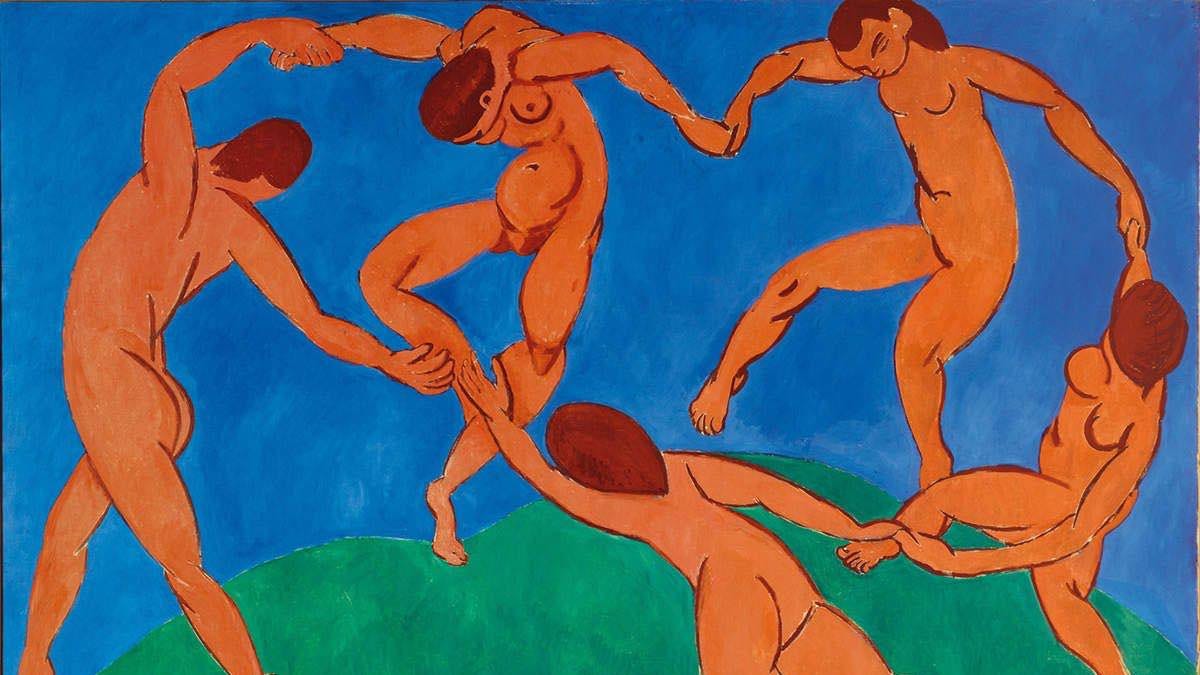
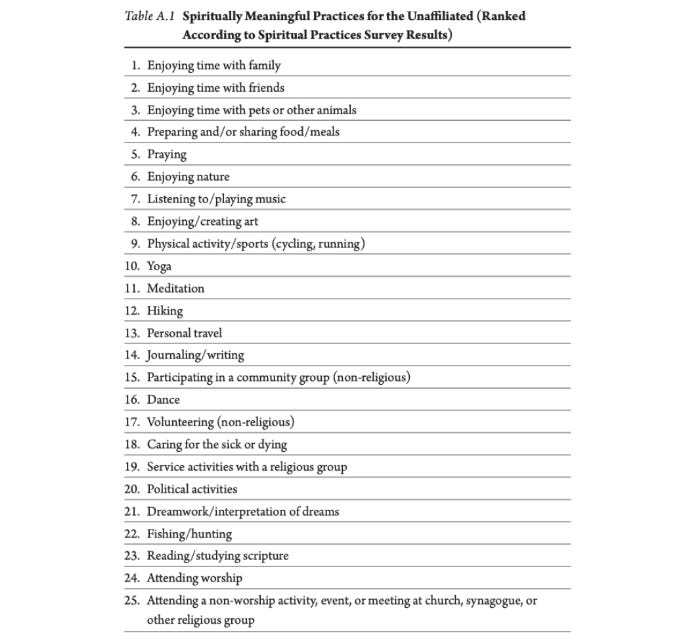
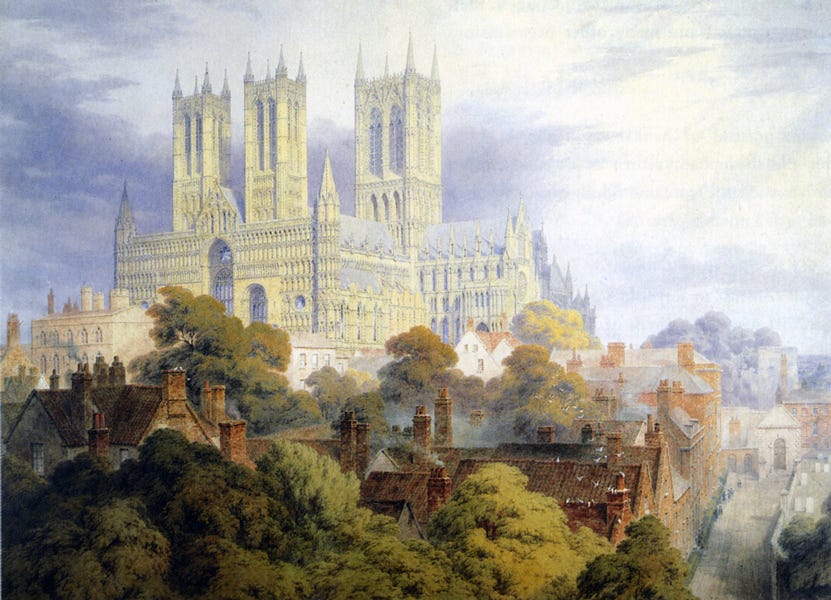
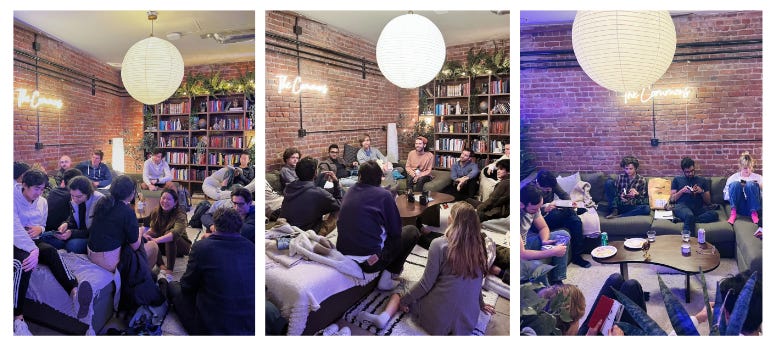
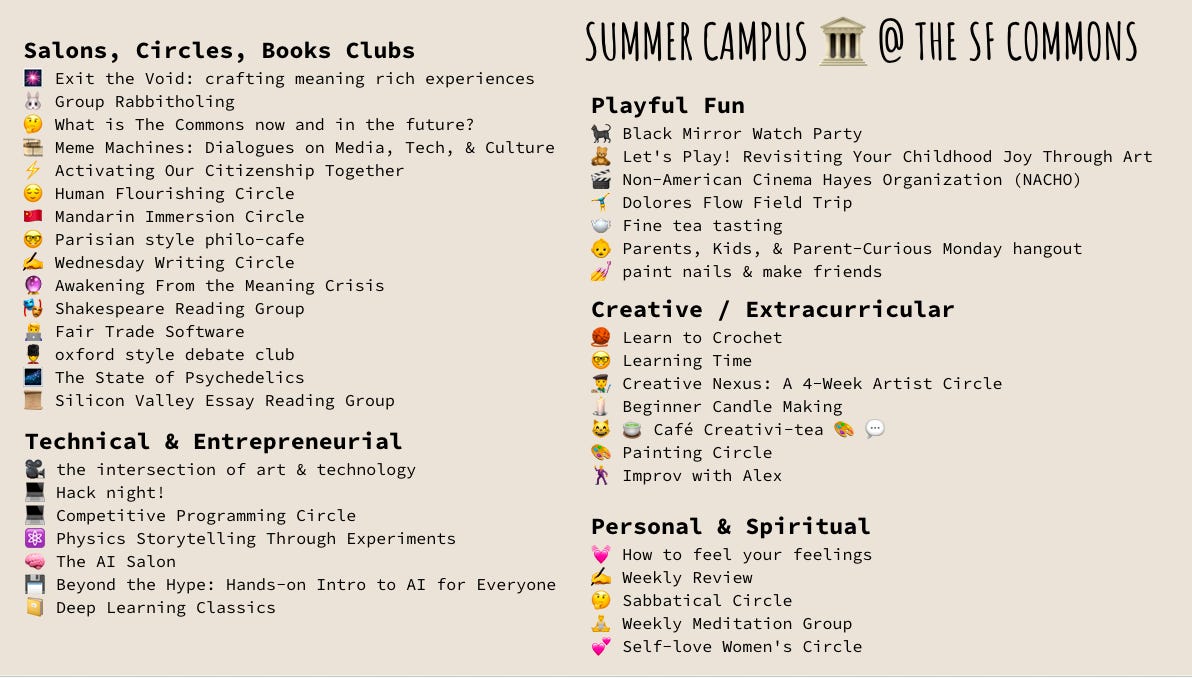
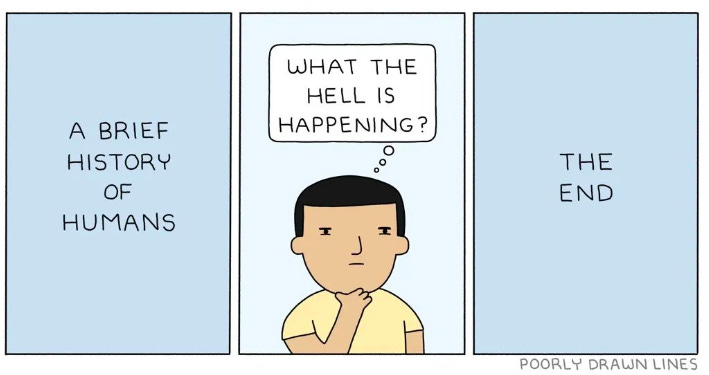
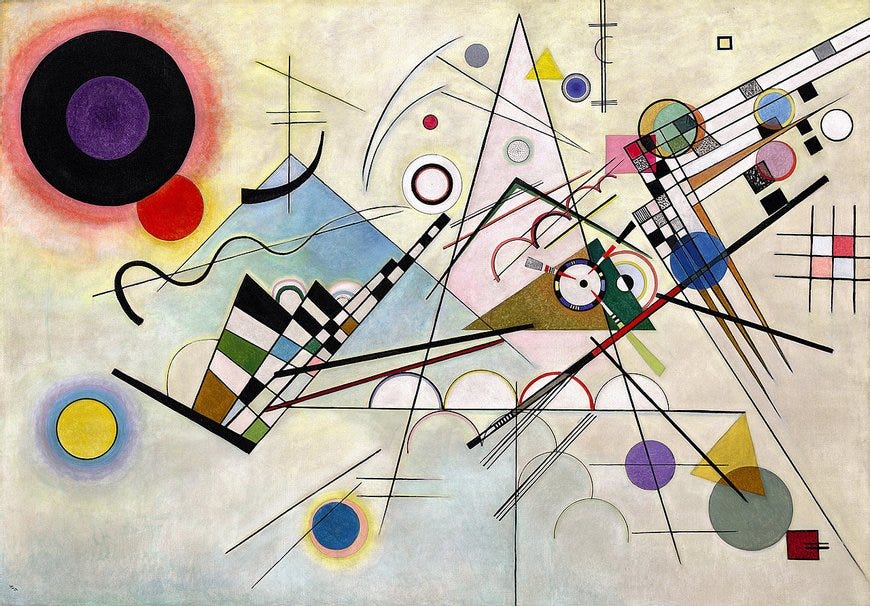
Hell. Yes.
The work is inspiring. It's going to absolutely lead others, like myself, to be encouraged to explore this space. Thank you for not only sharing but for continuing to invite others along with you.
Favorite part: "Imagine a sanctuary where individuals can step away from the mechanized routines of their lives, to reflect, play, discuss, and explore their curiosities in the company of earnest and kind community. A space that recognizes our shared essence, the interconnected threads that bind us all, manifesting in myriad expressions of the universe. And where that expression is not just tolerated, but passionately celebrated."
I am deeply interested in this exact thing, got a lot from this, thank you! Will definitely be creating some content about this soon :) thanks for the inspo